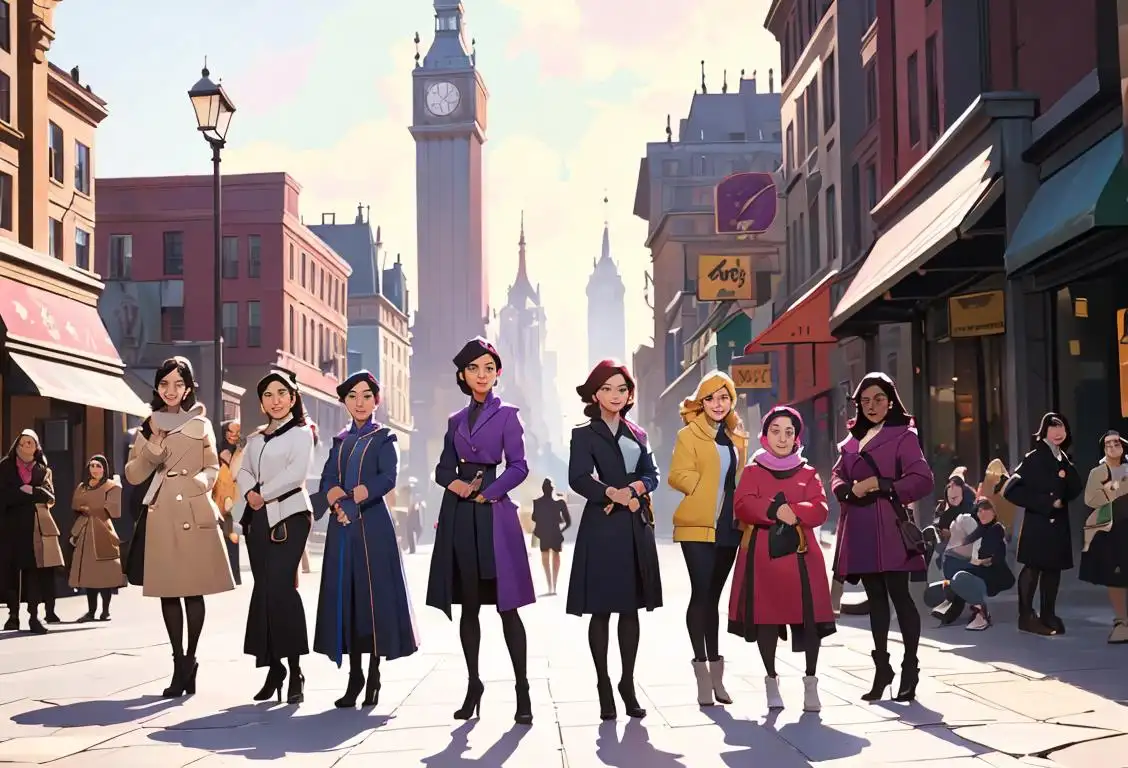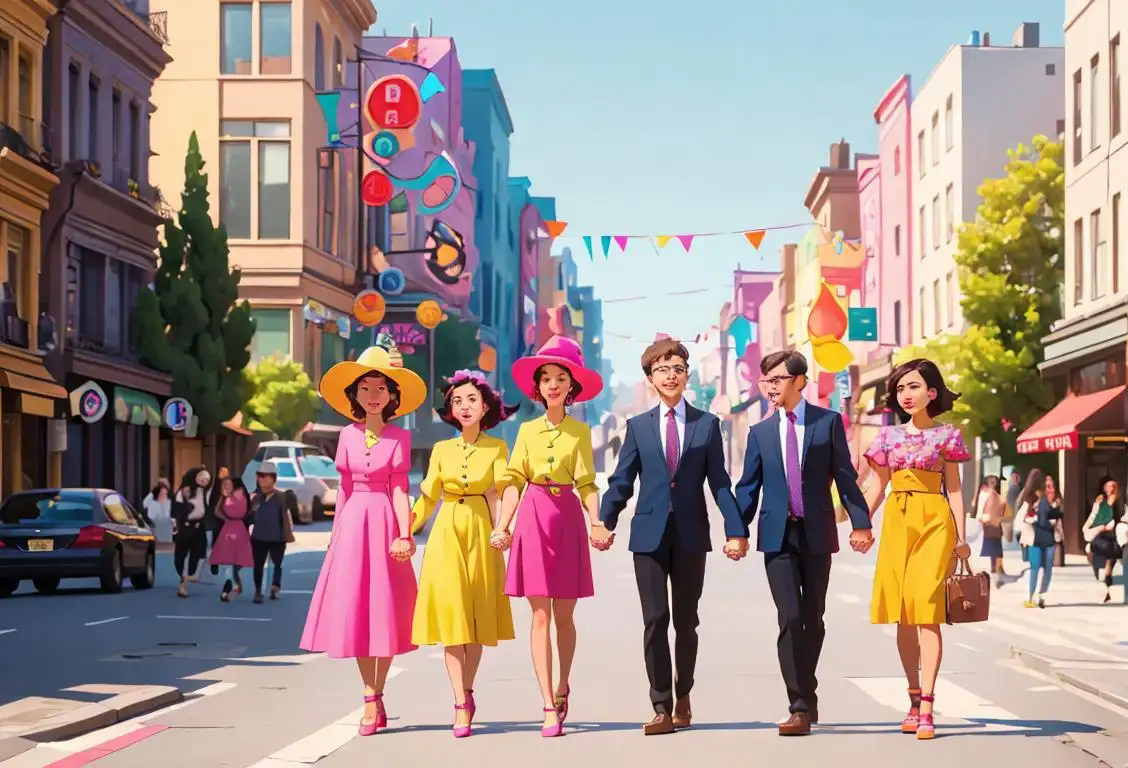National Heroine Day

Welcome to National Heroine Day, where we celebrate the incredible women who have made a difference in our lives and society! Get ready to be inspired and uplifted as we dive into the stories of these remarkable heroines.
When is Heroine Day?
It's national heroine day on the 20th April.
The Wonder Women of History
On National Heroine Day, we pay tribute to the amazing women who have shaped history and left their mark on the world. From fierce warriors to groundbreaking scientists, these heroines have broken through barriers and shattered stereotypes, proving time and time again that women are capable of anything.
One such iconic heroine is Marie Curie, the first woman to win a Nobel Prize. Her groundbreaking research on radioactivity not only revolutionized the field of science but also opened doors for countless women who came after her.
Another trailblazing heroine is Rosa Parks, whose brave act of defiance on that fateful day in 1955 sparked a civil rights movement and forever changed the course of history. Her refusal to give up her seat on a bus inspired countless others to stand up for what they believe in.
But it's not just the famous heroines who deserve recognition. National Heroine Day is an opportunity to celebrate the everyday heroines, the mothers, sisters, teachers, and friends who make a significant impact on our lives. Whether it's a kind word of encouragement or a superheroic feat of multitasking, these unsung heroines deserve our gratitude.
A Day to Remember and Inspire
National Heroine Day is not just about recognizing the heroines of the past and present, but also about inspiring the heroines of the future. It's a day to empower young girls and let them know that they can be heroes too. It's a day to encourage dreams and nurture aspirations.
So, how can you celebrate this momentous day? Well, you can start by acknowledging the heroines in your life. Tell them how much they mean to you and how their actions have made a positive impact. It can be as simple as writing a heartfelt note or giving them a big bear hug.
You can also support organizations that work towards gender equality and women's rights. By donating your time or resources, you can make a real difference in the lives of marginalized women and help create a more inclusive world. Remember, even the smallest act of kindness can be heroic.
Finally, take some time to reflect on the inspiring heroines who have shaped history. Read their biographies, watch documentaries, and immerse yourself in their stories. Let their determination and resilience inspire you to chase your dreams and make a difference in the world.
History behind the term 'Heroine'
1593
The Introduction of the Term 'Heroine'
The term 'heroine' was first introduced in the English language in 1593. It comes from the Latin word 'heroina', which means 'female hero' or 'warrior woman'. In its early usage, 'heroine' referred specifically to a woman of heroic qualities or exceptional courage.
1387
Origins in Old French
The term 'heroine' traces its origins back to the year 1387 in Old French. It derives from the word 'heroe', which referred to a legendary or mythical figure known for their exceptional bravery and noble qualities.
17th Century
Heroic Women in Literature
Throughout the 17th century, the concept of a 'heroine' grew in popularity, especially in literature. Women were portrayed as courageous, virtuous, and capable of extraordinary deeds. Heroic female characters appeared in plays, poems, and novels, captivating readers with their strength and determination.
1650
Expanding into English
By the year 1650, the term 'heroine' had made its way into the English language. It adopted a similar meaning as in Old French, referring to a female character in literature or mythology who displayed remarkable courage and virtue.
1806
Heroic Representation
In 1806, the term 'heroine' began to take on a broader meaning in society. It started to refer to a real-life woman who exhibited extraordinary bravery, exceptional achievements, or notable qualities deserving admiration and recognition.
19th Century
Feminism and the Rise of the Heroine
The 19th century marked a significant shift in the recognition of women's rights and the empowerment of women. This period witnessed the emergence of feminist movements and an increased focus on gender equality. As a result, the term 'heroine' became associated with women who challenged societal norms, fought for women's rights, and made significant contributions to various fields such as literature, science, and art.
1903
Emergence in Feminist Literature
Around the year 1903, the term 'heroine' gained prominence within feminist literature. It became associated with strong female protagonists who challenged societal norms and fought for women's rights, inspiring generations of women to assert their independence and agency.
20th Century
Heroines in Pop Culture
The 20th century saw the rise of heroines in popular culture. From iconic characters in films like Wonder Woman and Princess Leia to celebrated female athletes and activists, heroines became symbols of inspiration and empowerment. The term 'heroine' expanded beyond the realm of literature to encompass women who made a difference in real life.
Present Day
Celebrating Heroines Worldwide
In the present day, the term 'heroine' continues to hold significance as it represents extraordinary women who have made lasting impacts in various domains. International Women's Day and Women's History Month celebrate and honor the achievements of heroines throughout history. The term serves as a reminder of the remarkable contributions of women and inspires future generations to strive for greatness.
1970
Evolution in Pop Culture
By the 1970s, the concept of a 'heroine' expanded further in popular culture. It increasingly encompassed female characters in various forms of media, including books, films, and comic books. These heroines defied stereotypes and offered diverse representations of female strength, resilience, and empowerment.
Present
Inspiring Role Models
In the present day, the term 'heroine' continues to evolve and inspire. It represents women who make significant contributions in fields such as arts, sciences, sports, and social activism. Heroines serve as role models, breaking barriers, and inspiring future generations to embrace their own unique strengths and capabilities.
Did you know?
Did you know that National Heroine Day was first celebrated in 2015 to honor the unsung heroines whose contributions often go unnoticed? It's the perfect occasion to express gratitude to the heroines in your life and remember the remarkable women who have shaped history.Tagged
awareness inspiration women's rightsFirst identified
20th April 2015Most mentioned on
20th April 2015Total mentions
4Other days
Hillary Clinton Day
Heroine Day
Fouseytube Day
First Gen Day
Youth And Student Day
We Day
Astronaut Day
Thank A Teacher Day
Obama Appreciation Day
Kehlani Day








